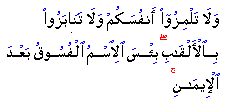Al-Hujurat
(The Chambers)
Chapter 49: Verse 11 (Partial)
 Culture of Insults Culture of Insults
"Neither defame one another, nor insult one another by nicknames. Bad is the name of lewdness after faith. And whoever does not repent, such are evil-doers."
Some people are disposed to be rude and abrasive. They speak harsh words that show no strength of argument or evidence, but are full of insults and abuse.
There is nothing wrong with people disagreeing and arguing with each other, especially in these troubled and confusing times. However, the way to handle disagreements is with lucid arguments and temperate speech. A person's mode of discussion should show the purity of his intentions, the strength of his intellect, and the nobility of his character.
It is apparent to everyone that the Muslim world is being stifled by numerous crises. It is like a ship being tossed about in a storm and the people on board are afraid that they will drown. Their voices all mix together. Some voices are merciful and concerned. Some are calm. Others are angry and seething. Then there is that voice that spews forth curses and insults left and right – but that voice always spares itself. Indeed the worst possible person is the one who sees only good in himself and evil in everyone else. Our brothers and sisters are part of ourselves, and we need to esteem them with the same regard that we esteem ourselves.
The Internet has provided us with a new way to insult and defame each other – the electronic insult. Now people can disseminate their insults and slanders free of charge and without any accountability, and have their names published along with their choice of words. Those who engage in this behavior openly are truly flaunting their own sinfulness.
The Internet also provides the opportunity to be anonymous, to hide behind a false name, and this allows the slanderer can forego all of his inhibitions. Unfortunately, sensible and balanced speech is often not much of an attention-getter. The electronic slanderer, on the other hand, is encouraged by the attention that he gets, both from those who support him and those who criticize him. He might even fool himself enough to think that he is making history!
This abuse of the electronic media is unscrupulous and unprincipled. Those who exhibit such behavior expose themselves as people bereft of values, people who are controlled by their basest passions and by the blindest of anger, and who are motivated by petty spite. Those who think that they are upholding the truth or defending the faith by behaving in such a way are only the more deceived.
Those of us who wish to keep on the straight path in this culture of insults need to do the following:
1. We can turn away from such behavior and from those who exhibit it. One of the Prophet's characteristics was that other people's ignorant behavior only made him behave more gently.
2. We can respond with something better. This means that we can pray to Allah on behalf of the other person and beseech Allah to forgive him. We can say something nice and counter a bad word with one that is good.
3. We must keep our composure and stay calm. Life is a long road, and we need rest and tranquility. Live your domestic life in contentment and serenity. Carry out your livelihood – be it commerce, industry, Islamic work, management, or whatever else Allah appoints for you in this world – quietly, serenely, patiently, and with a cheerful countenance. Do not pay any mind to those voices that seek to bring you down.
4. We should not waste time responding to and refuting what they say. Leave that to others. Not everything that we say is necessarily correct, and not everything that others say is wrong. We should spare ourselves the insults and abuses.
5. We must never let our animosities and other's disrespect goad us into denying the truth, uttering falsehood, or persisting in an error. We must make self-assessment and self-correction our habits.
6. We should remember that we have committed mountains of sins. We have looked at forbidden sights. We have said things we should not have said. We have been neglectful in our duties. Allah, in His kindness towards us, chooses for us the easier afflictions of this world to expiate for our sins or to elevate our status or to bring us to heights that we could never have reached with our good deeds alone.
Source:
"A Modern Culture of Insults" - Salman al-Oadah |